Contents
Looking for a powerful speech on climate change? Edukar has provided 5 Best speeches on climate change that consists of informative fact. Whether you’re a student, activist, or concerned citizen, this speech will equip you with the tools you need to make a difference in the fight against climate change.
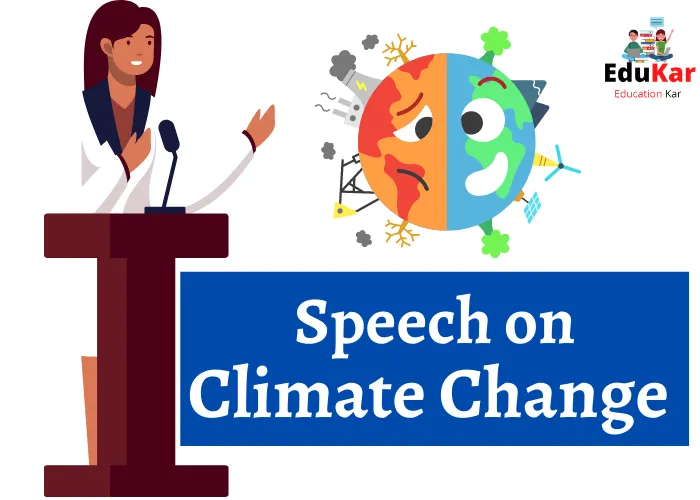
1st Climate Change Speech (20 min)
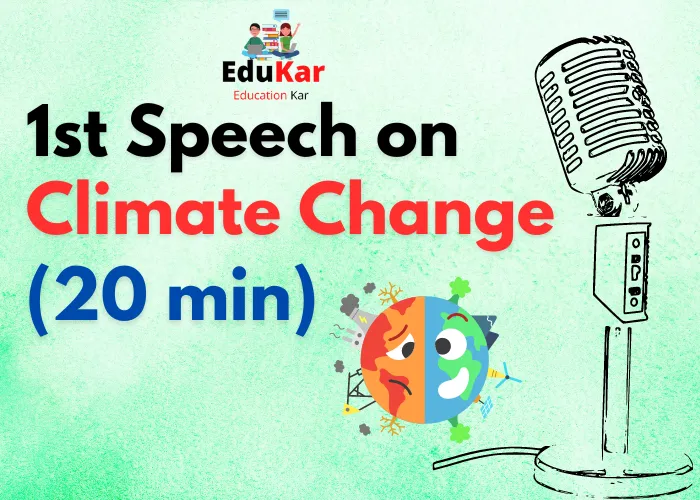
Good Morning/Afternoon/Evening Everyone,
I am here to talk about one of the most concerned issues of our time – climate change. Climate change is a global problem that affects every country, including India. It is caused by the emission of greenhouse gases, mainly carbon dioxide, from burning fossil fuels like coal, oil, and gas, as well as deforestation and other human activities.
The effects of climate change are already being felt in India, with rising temperatures, changing rainfall patterns, and increased frequency and intensity of extreme weather events like droughts, floods, and cyclones. These effects are not just a threat to the environment, but also to our economy, health, and way of life.
India is particularly vulnerable to the impacts of climate change because of its large and growing population, its reliance on agriculture and natural resources, and its coastal and Himalayan ecosystems. Climate change threatens to undermine the progress India has made in recent decades in reducing poverty, improving public health, and promoting sustainable development.
So what can we do to address this problem? There are several ways in which India can take action to mitigate and adapt to climate change.
We need to reduce our greenhouse gas emissions. India is the world’s third-largest emitter of greenhouse gases after China and the United States. To reduce our emissions, we need to shift to cleaner sources of energy like solar and wind power, promote energy efficiency in buildings and transportation, and reduce emissions from industry and agriculture.
The Indian government has already taken some steps in this direction, such as setting a target of achieving 175 GW of renewable energy capacity by 2022, launching the National Clean Energy Fund to promote clean energy research and development, and implementing the Perform, Achieve, and Trade scheme to improve energy efficiency in industry.
However, there is still a long way to go to meet these targets, and we need to accelerate our efforts in this area. We need to invest in renewable energy infrastructure, incentivize the adoption of clean technologies, and phase out the use of fossil fuels.
We need to adapt to the impacts of climate change that are already happening. This means building strong infrastructure, improving water management, enhancing disaster preparedness, and protecting vulnerable ecosystems.
India has already taken some steps in this direction, such as launching the National Adaptation Fund for Climate Change to finance adaptation projects, implementing the Pradhan Mantri Fasal Bima Yojana to provide crop insurance to farmers, and establishing the National Disaster Management Authority to coordinate disaster response.
However, again there is still a long way to go. We need to invest in climate-resilient infrastructure, strengthen our disaster preparedness and response capabilities, and protect our ecosystems through measures like reforestation and wetland restoration.
We also need to raise awareness and mobilize action on climate change at all levels of society. This means engaging with the public, civil society, and the private sector to promote climate action and build support for ambitious climate policies.
India has already taken some steps in this direction, such as launching the Green Good Deeds campaign to promote environmentally-friendly behavior, establishing the India Climate Collaborative to bring together philanthropists, investors, and civil society organizations to drive climate action, and hosting the International Solar Alliance to promote solar energy adoption in developing countries.
However, we need to do more to engage with the public and build awareness about the urgency of the climate crisis. We need to promote climate education in schools and universities, encourage public participation in climate policy-making, and incentivize private sector investment in clean technologies.
In the end, climate change is a global problem that requires global action. India has a critical role to play in this effort, as a major emitter of greenhouse gases and a country that is particularly vulnerable to the impacts of climate change. By taking ambitious action to reduce our emissions.
Thank You.
Also See: Speech on India
2nd Climate Change Speech (15 min)
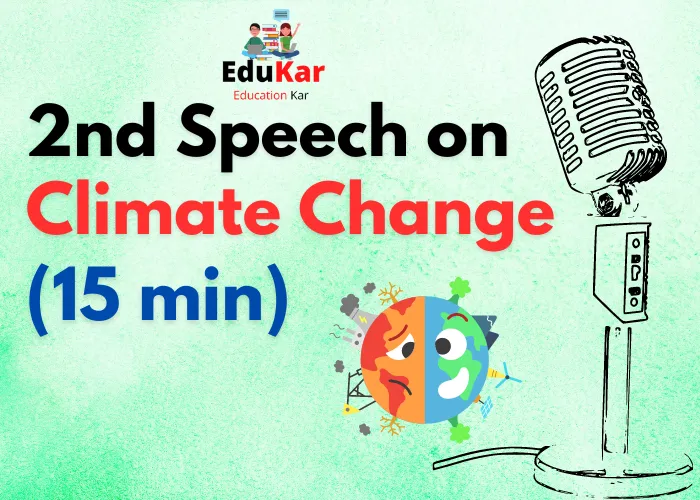
Good Morning/Afternoon/Evening Everyone,
I stand before you today to speak about one of the most pressing issues of our time: climate change. This is an issue that affects us all, regardless of our nationality, race, or social status. Climate change is a global problem, and it requires a global solution. However, I want to focus specifically on the impact of climate change in India and what we can do to address it.
India is a country that is particularly vulnerable to the effects of climate change. This is due to a number of factors, including vast population, high level of poverty, and reliance on agriculture. Climate change is already having a significant impact on India, with rising temperatures, changing rainfall patterns, and increased frequency of extreme weather events such as floods, droughts, and heatwaves.
One of the most significant impacts of climate change in India is on agriculture. India is an agricultural country, and millions of people depend on farming for their livelihoods. Climate change is already leading to declining crop yields, increased pests and diseases, and changes in the timing of planting and harvesting. This is a major concern, as it not only affects the livelihoods of farmers but also has implications for food security in India and globally.
Another impact of climate change is on water resources. India is already a water-stressed country, and climate change is exacerbating this problem. Changing rainfall patterns, melting glaciers, and rising sea levels are all affecting water availability in India. This is a particular concern for rural communities, which often lack access to safe and reliable water sources.
In addition to these impacts, climate change is also affecting public health. Rising temperatures and increased frequency of heatwaves are leading to more cases of heatstroke and other heat-related illnesses. Changing rainfall patterns and increased flooding are also leading to outbreaks of waterborne diseases such as cholera and dengue fever.
So what can we do to address these challenges? First, we need to take action to reduce greenhouse gas emissions. India is currently the third-largest emitter of greenhouse gases in the world, and it has a critical role to play in addressing climate change. India has made some progress in recent years, with a commitment to generate 40% of its electricity from renewable sources by 2030. However, much more needs to be done if we are to limit the worst effects of climate change.
One key area where India can take action is in the transport sector. This is a major source of greenhouse gas emissions in India, and it is also a sector where there is a great potential for reducing emissions. Encouraging the use of public transport, promoting cycling and walking, and incentivizing the adoption of electric vehicles are all measures that can help reduce emissions from the transport sector.
Another area where action is needed is in the agriculture sector. This is a sector that is particularly vulnerable to the effects of climate change, but it is also a sector that can play a key role in reducing greenhouse gas emissions. Promoting sustainable agricultural practices, such as agroforestry and conservation agriculture, can help reduce emissions while also improving soil health and increasing crop yields.
Finally, we need to focus on building resilience to the impacts of climate change. This means investing in infrastructure and systems that can withstand the effects of climate change, such as building sea walls to protect coastal communities from rising sea levels or developing drought-resistant crops. It also means ensuring that vulnerable communities have access to the resources they need to adapt to the changing climate, such as access to clean water, healthcare, and education.
Thank You
Also See: Speech on Clean India
3rd Climate Change Speech (10 min)
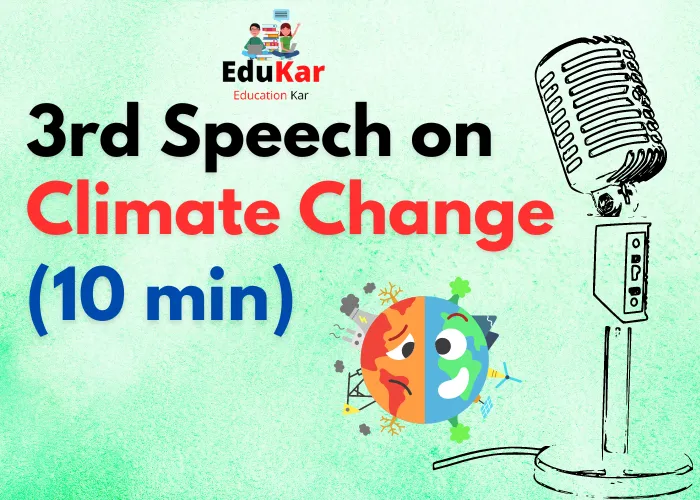
Good Morning/Afternoon/Evening Everyone,
Climate change is not a distant threat; it is happening now, and we are already experiencing its devastating consequences. From rising sea levels, to more frequent and severe natural disasters, to droughts and heatwaves, climate change is already impacting communities around the world.
As responsible global citizens, it is our collective duty to take action to deplete climate change. But what can we do? We must acknowledge that climate change is real and is caused by human activities, such as burning fossil fuels and deforestation. We must also recognize that we have the power to mitigate and adapt to its effects.
To reduce the impact of climate change, we must reduce our carbon footprint. This means we must take concrete steps to reduce our greenhouse gas emissions. There are many ways we can do this, such as using renewable energy sources like solar and wind power, promoting energy efficiency and conservation, and investing in public transportation and electric vehicles. We can also reduce our reliance on single-use plastics, which contribute to ocean pollution and harm marine life.
In addition to reducing the effects of climate change, we must also adapt to its consequences. This means taking steps to protect our communities from the impacts of climate change, such as sea-level rise, flooding, and extreme weather events. We can do this by building resilient infrastructure, protecting critical ecosystems, and developing early warning systems to prepare for natural disasters.
But to truly address the challenge of climate change, we need global action. We must work together as a global community to reduce greenhouse gas emissions and protect vulnerable communities from the impacts of climate change. This requires political will and leadership at all levels, from national governments to local communities.
We must also recognize the role of developing countries in the fight against climate change. Many developing countries are particularly vulnerable to the impacts of climate change, such as droughts, floods, and hurricanes. They often lack the resources to address these challenges on their own. As such, it is crucial that we provide support to these countries to help them adapt to the effects of climate change and transition to a low-carbon economy.
Finally, we must all recognize that we have a role to play in combating climate change. Every individual can make a difference by taking small steps to reduce their carbon footprint, such as using energy-efficient appliances, reducing meat consumption, and using public transportation. We can also engage in advocacy and education efforts to raise awareness about the urgent need to address climate change.
In conclusion, climate change is an urgent and pressing issue that requires immediate action. We must take concrete steps to mitigate and adapt to its effects, and work together as a global community to reduce greenhouse gas emissions and protect vulnerable communities. Let us all do our part to ensure a sustainable and prosperous future for ourselves and for future generations.
Thank you.
Also See: Speech On Air Pollution
4th Climate Change Speech (5 min)
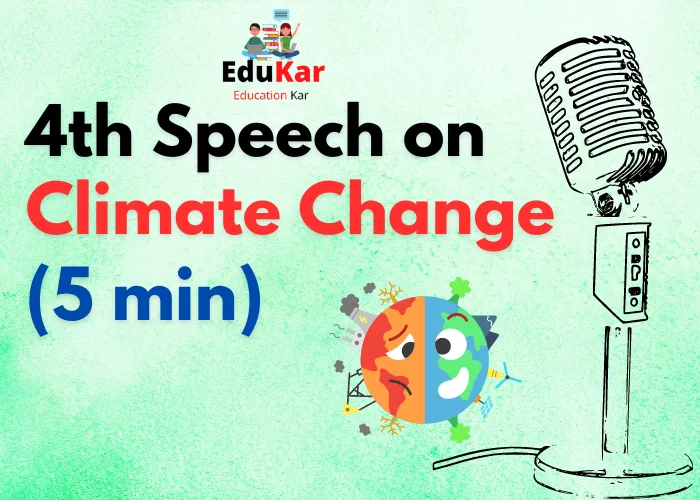
Good Morning/Afternoon/Evening Everyone,
Climate change is a global challenge that affects us all. The impacts of climate change can be seen in various forms, such as rising sea levels, increasing temperatures, extreme weather events, and melting glaciers. These changes are causing a significant impact on our environment, economy, and society.
India is one of the countries that are most vulnerable to the effects of climate change. The country is facing a significant challenge to ensure sustainable development while addressing climate change. The impacts of climate change are already visible in India, with increasing temperatures, water scarcity, and changing rainfall patterns. These changes are affecting our agriculture, health, and livelihoods.
The Indian government has recognized the importance of climate change and has taken several steps to address the issue. The government has set an target of achieving 175 GW of renewable energy by 2022, and it has already made significant progress towards achieving this goal. India has also launched the International Solar Alliance, which aims to promote the use of solar energy globally.
There is still much more that needs to be done. India is a developing country, and we face several challenges in meeting our development goals while addressing climate change. We need to invest in research and development to find sustainable solutions to address climate change. We also need to promote awareness and education about climate change to build a strong public consensus for action.
As citizens of India, we also have a role to play in addressing climate change. We can make small changes in our daily lives, such as conserving water, using public transport, reducing waste, and using renewable energy. These small steps can have a significant impact on reducing our carbon footprint and helping to address climate change.
Finally, climate change is a significant challenge that requires urgent action from all of us. As a country, we need to take bold steps towards a sustainable future. We need to work together to find innovative solutions to address climate change and ensure a better future for our children and future generations. Let us join hands and take collective action to protect our planet from the impacts of climate change.
Thank you.
Also See: Speech About Nature
5th Climate Change Speech (3 min)
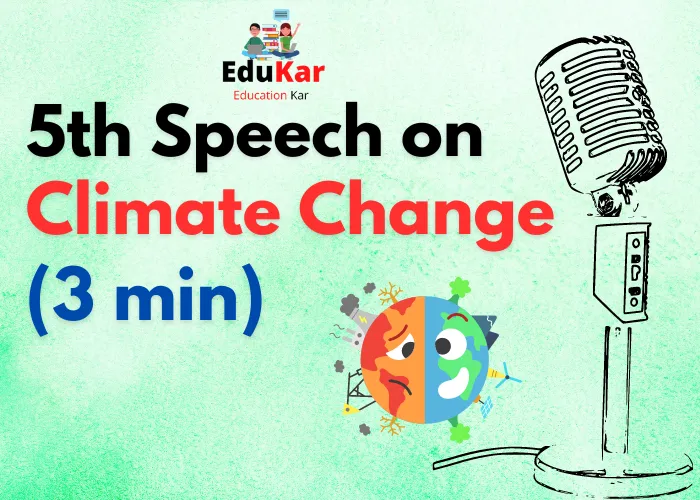
Good Morning/Afternoon/Evening Everyone
It is an honor to be here today to talk about one of the most pressing issues of our time – climate change. Climate change is a global issue that affects us all, but its impact on India is particularly severe. With a population of over 1.3 billion people, India is one of the most populous countries in the world, and its economy is growing rapidly. However, this growth has come at a cost, and climate change threatens to undermine India’s progress and prosperity.
The effects of climate change are already being felt in India and as well over the world. Rising temperatures are leading to more frequent and severe heatwaves, which in turn have serious consequences for human health and agriculture. In addition, changes in rainfall patterns are affecting the availability of water, which is a critical resource for India’s economy and society. Climate change is also exacerbating the risks of extreme weather events, such as floods and cyclones, which can cause widespread damage and loss of life.
Several actions has been taken to address climate change. The country has set ambitious targets for renewable energy and has made significant progress in expanding its solar and wind power capacity. India is also working to improve the energy efficiency of its buildings, industry, and transport sectors. In addition, the government has launched initiatives to increase the forest cover and protect biodiversity.
However, much more needs to be done. We must continue to invest in renewable energy and energy efficiency, and must accelerate the transition away from fossil fuels. The country must also develop policies and strategies to adapt to the impacts of climate change, particularly in the most vulnerable regions and communities. And finally, India must work with other countries to address climate change on a global scale, as this is a problem that cannot be solved by any one nation alone.
In th end, climate change is one of the greatest challenges of our time, and its impact on India is particularly severe. However, India is taking action to address this challenge, and there is hope that we can build a more sustainable and resilient future for our country and our planet. It is up to all of us to take responsibility for our actions and work together to create a better future for ourselves and for generations to come.
Thank you.
FAQs
What is the Climate Change Speech?
The Climate Change Speech is a speech or presentation that is widely regarded as one of the most effective, powerful, or influential speeches on the topic of climate change.
Can a speech really make a difference in the fight against climate change?
Yes, a powerful speech can be a reason for change, inspiring individuals and communities to take action, putting pressure on leaders to make policy changes, and raising public awareness about the urgent need to address climate change.
What policies and initiatives can governments and organizations adopt to address climate change?
Governments and organizations can adopt a range of policies and initiatives to address climate change, such as implementing carbon pricing, investing in renewable energy, promoting energy efficiency, and regulating emissions from industries.

![5 Best Global Warming Speech [Short & Long] Global Warming Speech](https://edukar.in/wp-content/uploads/2023/03/Global-Warming-Speech.webp)
![Speech on Cleanliness [Short & Long] Speech on Cleanliness](https://edukar.in/wp-content/uploads/2023/03/Speech-on-Cleanliness.webp)

![5 Best Speech on Clean India [Short & Long] Speech on Clean India](https://edukar.in/wp-content/uploads/2023/03/Speech-on-Clean-India.webp)
![5 Best Speech on Air Pollution [Short & Long] Speech on Air Pollution](https://edukar.in/wp-content/uploads/2023/03/Speech-on-Air-Pollution.webp)
![5 Best Speech on Water [Short & Long] Speech on Water](https://edukar.in/wp-content/uploads/2023/03/Speech-on-Water.webp)

![5 Best Speech on APJ Abdul Kalam [Short & Long] APJ Abdul Kalam Speech](https://edukar.in/wp-content/uploads/2023/03/APJ-Abdul-Kalam-Speech.webp)
![5 Best Speech on Bhagat Singh [Short & Long] Bhagat Singh Speech](https://edukar.in/wp-content/uploads/2023/03/Bhagat-Singh-Speech.webp)
![Speech on Mahatma Gandhi [Short & Long] Speech on Mahatma Gandhi](https://edukar.in/wp-content/uploads/2023/03/Speech-on-Mahatma-Gandhi.webp)
![5 Best Speech on Jawaharlal Nehru[Short & Long] Jawaharlal Nehru Speech](https://edukar.in/wp-content/uploads/2023/03/Jawaharlal-Nehru-Speech.webp)
![Speech about Nature [Short & Long] Speech about Nature](https://edukar.in/wp-content/uploads/2023/03/Speech-about-Nature.webp)

![Speech On Swami Vivekananda [Short & Long] Speech On Swami Vivekananda](https://edukar.in/wp-content/uploads/2023/03/Speech-On-Swami-Vivekananda.webp)
![Speech on Success [Short & Long] Speech on Success](https://edukar.in/wp-content/uploads/2023/03/Speech-on-Success.webp)
